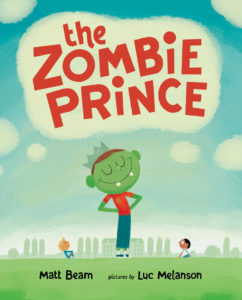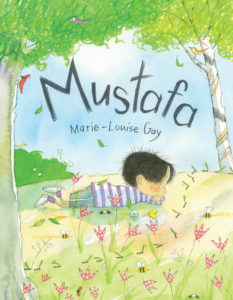November 30, 2018
The Zombie Prince and Mustafa
 The Zombie Prince, by Matt Beam and Luc Melanson
The Zombie Prince, by Matt Beam and Luc Melanson
The first time we read The Zombie Prince, I was entranced by it, its puzzles and strangeness, how curiously it was framed, but the rest of my family weren’t so into it. “I didn’t get it,” they said, but I insisted, that this was a book that was special, that this was a book about boys and their feelings and the powers inherent in being sensitive. So we read it again, and they started to get it, liked the book as much as I do. I book that invites plenty of questions, which is why reading it again and again is worthwhile. “Why did Brandon tear up the flower?” I asked them tonight, and they speculated. This book isn’t breezy and is not a one-off, and runs the risk of being just a bit too subtle, but the illustrations are fun and appealing and the ideas of zombies and vampires are attractive enough to make a reader pick up the book a second time. This is a book with undercurrents, and the discerning reader will be able to put the pieces together. The discerning older reader will also be able to understand the implications of Brandon’s classmate having called him a “fairy,” and that this is a story with big implications. I appreciate its lack of obviousness, and that this is a book about boys and feelings that isn’t cheesy, or preachy. It’s expansive, like all the best books are, and isn’t afraid to ask its readers to think.
*
In her latest picture book, Marie-Louise Gay moves from her worlds of flying cats and a brother and sister in bucolic idylls to a different kind of reality, although it still comes with her characteristic whimsy. The title character in Mustafa is a young boy who has moved with his family away from an old country he still dreams of. “Dreams full of smoke and fire and load noises.” Lonely, he plays alone in the near near his new home, and takes in his new surroundings—shiny red bugs with black spots on their backs, trees whose leaves mysterious turn orange and red. “He sees two small animals jumping from branch to branch, They bushy tails wave and curl in the air. They chatter like monkeys.” There’s also a girl who walks a cat on a leash, and Mustafa is fascinated by all of it, but the girl in the particular because he fancies a friend. He asks his mother if perhaps he’s invisible. ‘”If you were invisible, I couldn’t hug you, could I?” answers his mama.’ But then one day the girl gestures for him to follow her, and they go together to watch fish in the pond. And Mustafa doesn’t feel invisible anymore, which makes for a really nice story about a refugee’s experience, but also an interesting exercise in seeing our homes from other people’s points of view, what we all look like from the outside, and how much it means to be invited in.






